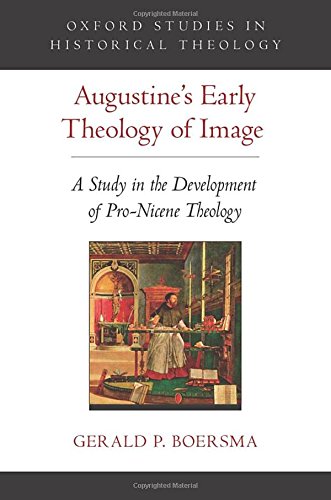(Ebook) Augustine's early theology of image : a study in the development of pro-nicene theology by Boersma, Gerald P ISBN 9780190251369, 0190251360
This book examines Augustine's early theology of the imago dei, prior to his ordination (386-391). The book makes the case that Augustine's early thought is a significant departure from Latin pro-Nicene theologies of image only a generation earlier. The book argues that although Augustine's early theology of image builds on that of Hilary of Poitiers, Marius Victorinus, and Ambrose of Milan, Augustine was able to affirm, in ways that his predecessors were not, that both Christ and the human person are the image of God. Augustine's Latin pro-Nicene predecessors understood the imago dei principally as a Christological term designating a unity of divine substance. According to the book, Augustine's early theology of image has its initial departure not in the controversy of Nicaea but, rather, in the philosophical engagement of Plotinian metaphysics, in which all finite reality is an image of ultimate reality. For this tradition, an image need not imply equality; an image can be more or less like its source. The book maintains that Augustine's early writings describe Christ as an image of equal likeness while the human person is an image of unequal likeness. A Platonic and participatory evaluation of the nature of "image" enables Augustine's early theology of the image of God to move beyond that of his Latin predecessors and affirm the imago dei both of Christ and of the human person. Abstract: This book examines Augustine's early theology of the imago dei, prior to his ordination (386-391). The book makes the case that Augustine's early thought is a significant departure from Latin pro-Nicene theologies of image only a generation earlier. The book argues that although Augustine's early theology of image builds on that of Hilary of Poitiers, Marius Victorinus, and Ambrose of Milan, Augustine was able to affirm, in ways that his predecessors were not, that both Christ and the human person are the image of God. Augustine's Latin pro-Nicene predecessors understood the imago dei principally as a Christological term designating a unity of divine substance. According to the book, Augustine's early theology of image has its initial departure not in the controversy of Nicaea but, rather, in the philosophical engagement of Plotinian metaphysics, in which all finite reality is an image of ultimate reality. For this tradition, an image need not imply equality; an image can be more or less like its source. The book maintains that Augustine's early writings describe Christ as an image of equal likeness while the human person is an image of unequal likeness. A Platonic and participatory evaluation of the nature of "image" enables Augustine's early theology of the image of God to move beyond that of his Latin predecessors and affirm the imago dei both of Christ and of the human person
*Free conversion of into popular formats such as PDF, DOCX, DOC, AZW, EPUB, and MOBI after payment.


